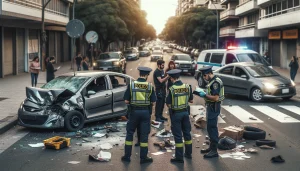Car accident cases typically commence when one party suffers damage as a result of a vehicle collision. The damage might be to their car, their person, or both. Oftentimes, the individual, known as the claimant, will seek compensation for their losses from the party they believe is responsible for causing the accident.
Determining Fault in Car Accident Cases
Establishing liability is central to any
Car accident case. Liability essentially translates into who was at fault for the accident. In some situations, it may be clear who is accountable. However, other cases may require comprehensive investigations where evidence is collected and analyzed, including police reports, eye witness testimonies, photographs from the accident scene, and expert opinions.

Understanding Damages in Car Accident Claims
Damages in the context of car accidents refer to the losses suffered by an injured party due to the accident. These could include medical expenses, vehicle repair costs, loss of income, and pain and suffering, among others. The amount of damages awarded in a case can greatly influence the duration it takes to resolve the case. In general, higher amounts tend to complicate negotiations and can potentially prolong the case.
Navigating Insurance Companies
Following a car accident, dealing with insurance companies is often a necessary step toward resolution. Insurance providers play a significant role in settling car accident cases in terms of issuing compensation for damages. However, this process can often be time-consuming and complex given that these companies usually aim to minimize their payout. Hence, understanding how to effectively navigate dealings with insurance companies is paramount in car accident cases.
The Role of Legal Representation
In many cases, claimants may choose to engage legal assistance to help them manage their car accident case. Lawyers specializing in this field have substantial expertise in negotiating with insurance companies, deciphering the language of policy contracts, and representing the client in court if necessary. The presence of legal representation can be an influential factor in the time taken to resolve a
Car accident case.
Timeframe Factors in Car Accident Cases
Immediate Aftermath of a Car Accident
The time immediately following a car accident is crucial in influencing the overall timeline for resolution. It involves different steps, primarily documentation of the incident via a police report and initial medical consultation to address any potential injuries. This phase could take a few days to a couple of weeks, depending on the severity of the accident and the complexity of the reporting process.
Claim Filing and Negotiation Period
The claim filing process also plays a significant part in the time it takes to resolve a car accident case. Once all the necessary documentation is gathered, a claim is filed with the at-fault party's insurance provider. It’s followed by a negotiation period where the parties discuss the terms of the settlement. The duration of this period can vary significantly, from a few weeks to several months, largely depending on the complexity of the case and the willingness of involved parties to reach an agreement.
Discovery and Litigation Process
In cases where negotiation fails to yield an agreeable settlement, it may be necessary to file a lawsuit which initiates the discovery and litigation process. During discovery, both sides investigate the facts of the case, including accident details, medical history, and witness testimonies. This is a lengthy phase and can last anywhere from six months to a year, or even longer, depending on the specific circumstances of the case.
Preparation Towards Trial
If a settlement is still not reached post discovery, the case moves to the trial preparation stage. This stage involves meticulous planning and drafting of the court arguments. Varying widely based on the complexity of the case, it could take from a few months to over a year.
Trial and Judgment
Lastly, the actual trial phase comes into play. The duration of this phase is unpredictable and can range from a day, to weeks, and even months, depending on the court's schedule, the nature of the case and the pace at which the information is presented and deliberated upon. Once the trial concludes, it may take additional time for the judgment to be handed down and for any possible appeals to be addressed.
Steps in Resolving a Car Accident Case
Initial Investigation and Documentation
The first step in resolving a
Car accident case is to conduct an initial investigation. This involves gathering all the necessary information about the accident, such as police reports, eyewitness accounts, and photographs of the scene and any damages. Medical records should be collected if injuries were sustained. Legal representation should be sought at this point as well, and all relevant information should be shared with your attorney.
Claim Submission and Communication
After all the pertinent accident information has been collected, it's time to submit your claim. The claim contains all the necessary information about the accident for the insurance company to evaluate. Once you’ve submitted the claim, the insurance company will assign an insurance adjuster to communicate directly with you. They are responsible for steering the settlement negotiations, so maintaining good communication with them is crucial.
Negotiation Process
The negotiation process begins once the insurance adjuster offers their initial settlement amount. This offer is usually lower than what the victim deserves. Thus, it should be evaluated carefully by comparing it with the damages suffered physically, emotionally, and financially. If the offer is unfair, you can dispute it by submitting counteroffers until a fair agreement is reached.
Litigation and Resolution
If the negotiation process fails to yield a satisfactory result, the case may proceed to litigation. The victim files a lawsuit against the party at fault or the insurance company. From there, the case might go to trial or get resolved through alternative dispute methods such as mediation or arbitration. Trials are often lengthy and require exhaustive preparation. Nevertheless, they could potentially lead to higher compensation than what was initially offered.
Receiving the Settlement
Once a settlement is agreed upon, whether through negotiation or litigation, the final step is receiving the agreed-upon compensation. This typically comes in the form of a check from the insurance company. Legal fees and other case-related costs are often deducted from this amount before it reaches the accident victim. It's essential to understand all these points in order to have a clear expectation of what and when you will receive the settlement.
Delays That May Occur in Car Accident Cases
Lengthy Investigation Process
Sometimes, car accident cases can be delayed due to a lengthy investigation process. Insurers must establish fault in the accident, and this can require an intricate investigation involving multiple parties and sources of information. This may include interviews with involved parties, analysis of physical evidence, review of medical records, and police reports. If there are disagreements or conflicting information, this can further prolong the investigation.
Medical Treatment and Evaluation Duration
Another common cause of delay in car accident cases is the treatment and evaluation of injuries. It is critical for the injured party to reach a point of 'maximum medical improvement' (MMI) before a case can be resolved. This is the point at which injuries have either fully healed or are not expected to improve further. Only then can the full cost of medical expenses and future needs be accurately calculated. This process can sometimes take several months to a few years, depending on the severity of the injuries.
Negotiation between Parties
Negotiations between the insurance company and the injured party can also be a source of delay. The insurance company may initially offer a settlement amount that the injured party deems insufficient. A negotiation process will then ensue, during which both parties will attempt to agree on an acceptable settlement figure. Unfortunately, this process can be time-consuming and extend the duration of the case.
Legal Complexities and Disputes
In some cases, legal disputes and complexities can slow down the resolution of a
Car accident case. These might include disputes over liability, interpretation of laws, applicability of insurance policy provisions, or the admissibility of certain pieces of evidence. Such issues often necessitate additional legal research, consultations with experts, and potentially even court hearings, further extending the timeline.
Court Backlogs
Finally, if a car accident case proceeds to trial, court backlogs can be a major source of delay. Courts often have packed schedules, and it may take a long time before a trial date is available. This can add several months, or even years, to the overall resolution timeline of a car accident case.
The Role of Insurance Companies in Car Accident Cases
Initial Interaction with Insurance Companies
After a car accident, the first interaction typically involves reporting the incident to the involved parties' insurance companies. The insurance company's role begins here, as they take the details of the accident to start their investigation process. The claimant might also be required to submit any supporting documents like photographs, witness statements, and medical records.
Investigation and Assessment of Claims
The primary role of insurance companies in
Car accident cases is assessing and investigating claims. During this process, they evaluate the circumstances surrounding the accident, determining who was at fault. They examine the police report, inspect the vehicle damage, analyze medical reports, and sometimes even conduct interviews with witnesses. Based on these findings, the company determines the validity of the claim and the amount payable for damages.
Settlement Negotiations
Often, there are discrepancies between the claimant’s demands and what the insurer deems appropriate to offer. This is when settlement negotiations come into play. The insurance company's representative and the claimant, usually aided by their lawyer, engage in discussions to arrive at a mutually agreed-upon amount. These negotiations may go back and forth multiple times before an agreement is reached.
Payment of Claims
Once a claim is approved, the insurance company's role extends to the disbursement of the payout. This includes payments for vehicle repairs, medical expenses, and other related costs as mentioned in the policy. The method and timeline of payment may vary based on the company and policy specifics.
Legal Representation
In some instances, if an amicable settlement cannot be reached or if disputes about the accident cause arise, the case may go to court. In such scenarios, the insurance company provides legal representation to defend their policyholder. They hire attorneys to argue the case, further highlighting their crucial role in car accident cases. This is particularly relevant for at-fault drivers whose actions are being challenged.
Legal Processes Involved in Car Accident Cases
Initial Investigation and Gathering of Evidence
The legal process after a car accident usually begins with an immediate on-scene investigation by law enforcement officers into the cause of the accident. They take statements from all parties involved, witnesses, and collect other relevant evidence like photos and videos of the accident site. They then prepare an official accident report detailing their findings. Concurrently, victims or their attorneys should gather medical reports related to any injuries sustained.
Filing of a Lawsuit
If there's no satisfactory resolution reached through the insurance claim process, a lawsuit may be filed. The plaintiff (the injured party) files a complaint in the appropriate court establishing the defendant's (the other party involved in the accident) negligence and claiming damages for
Personal injury or property damage. The defendant is served with the complaint and given a specified period of time to respond.
Pre-Trial Discovery
In the discovery phase, both parties are allowed to investigate the validity of each other's claims and defenses. This includes interrogatories (written questions that must be answered under oath), depositions (witnesses' out-of-court testimony recorded for later use), and requests for documents.
Negotiations and Potential Settlement
Before trial, both parties will often attempt to reach a settlement to avoid the time and cost of going to court. A neutral third party, known as a mediator, may assist in negotiating a settlement. The process includes presenting evidence, reevaluating the strengths and weaknesses of the case, and bargaining over the settlement amount.
Trial
If settlement negotiations fail, the case proceeds to trial. This process involves presenting evidence to a judge or jury, who will then determine fault and award damages. While most car accident suits are settled out of court, some may end up going to trial depending on the complexity of the case and the amount of damages claimed.
Tips to Expedite Resolution of Car Accident Cases
Gather and Organize All Relevant Evidence
One of the most effective ways to expedite the resolution of a
Car accident case is by gathering all relevant evidence promptly. This includes photos of the car damage, eyewitness accounts, police reports, surveillance footage, if available, and any other evidence that may elucidate how the accident occurred. Detailed medical records, doctor's notes and even receipts for related expenses are vital to establish the extent and financial impact of your injuries. Keeping this evidence organized and readily accessible can considerably speed up the process, as it provides clear information for your legal counsel and any insurance companies involved.
Prompt Communication
Staying on top of communication with all parties involved can significantly reduce the duration of the case. Responding promptly to any requests for information from your attorney, the court or insurance companies can help avoid unnecessary delays. It's also crucial to keep your lawyer informed about any changes in your medical condition or treatment, as this could affect the outcome of your case.
Engage a Competent Layer Early
Securing competent legal representation early in the process is an important step towards expediting the resolution of
Car accident cases. Skilled attorneys can navigate the intricacies of the legal system more efficiently, negotiate effectively with insurance companies, and present a well-structured case in court if necessary. Additionally, legal professionals can help minimize common procedural errors that might stall the process.
Willingness to Negotiate a Settlement
While it may be tempting to hold out for a larger payout, a willingness to negotiate can often lead to a quicker resolution. Most car accident cases are settled out of court, which tends to be a faster process than going to trial. By thoroughly discussing the pros and cons of settlement offers with your attorney, you can make an informed decision that balances potential compensation with a prompt resolution.

Comprehensively Document the Impact of the Accident
In addition to medical impacts, a car accident can have significant psychological and lifestyle effects. Documenting these thoroughly provides a more comprehensive account of the accident's impact, which can support your case and speed up the resolution. This includes details related to psychological counseling received, loss of enjoyment in hobbies or activities, inability to complete household tasks, and any other changes to your daily life resulting from the accident.
Conclusion
In conclusion, navigating through the complexities of a
Car accident case demands considerable time, patience, and a keen understanding of legal and insurance procedures. Successfully resolving such matters involves delving into the various factors that impact the case's duration, such as the extent of injuries, liability determination, and negotiation with insurance companies. By adeptly managing these aspects and employing efficient strategies, individuals embroiled in such cases can strive for a swift and favorable resolution to their claims, alleviating the stress and uncertainty often associated with prolonged legal proceedings.
Understanding that expediting the process requires a proactive approach, individuals should be diligent in gathering evidence, cooperating with legal counsel, and engaging in constructive dialogue with insurance providers. Additionally, staying informed about the latest developments in relevant laws and regulations can empower individuals to make informed decisions and navigate potential obstacles more effectively. Ultimately, by remaining patient yet persistent, and by leveraging the expertise of legal professionals when needed, individuals can enhance their chances of achieving a timely and satisfactory resolution to their car accident claims.
Look for an attorney who has the right legal resources for your legal needs.
Contact us here on the
Warmuth Law website or through our hotline 888-517-9888.
1. Can I resolve a car accident case without hiring an attorney?
Yes, it's possible to settle a car accident case without legal representation, but having an experienced attorney can significantly enhance your chances of securing a favorable outcome and streamline the resolution process. An attorney can navigate the complexities of insurance negotiations, assess the full extent of your damages, and advocate for your best interests, ultimately maximizing your compensation.
2. What if the insurance company denies my claim?
If your claim is denied by the insurance company, you still have options. You can appeal the decision or take legal action against the at-fault party to pursue compensation for your damages. An attorney can review the denial, gather additional evidence to support your claim, and represent you in negotiations or litigation to challenge the insurer's decision.
3. How can I afford legal representation for my car accident case?
Affording legal representation for your car accident case is often feasible through contingency fee arrangements. Many
Personal injury attorneys work on a contingency fee basis, meaning they only receive payment if they successfully recover compensation for you. This arrangement allows you to pursue your claim without worrying about upfront costs, as the attorney's fees are contingent upon the outcome of your case.
4. What should I do if the other party involved in the accident doesn't have insurance?
If the at-fault party doesn't have insurance or is underinsured, you may still have options for compensation. Your own insurance policy may include coverage for uninsured or underinsured motorists, which can help cover your damages in such situations. An attorney can assist you in navigating the process of filing a claim with your insurance company and maximizing the benefits available to you.
5. Is there a time limit for filing a car accident claim?
Yes, there are statutes of limitations that dictate the timeframe within which you must file a car accident claim. These time limits vary by state, ranging from one to six years or more. It's crucial to consult with an attorney promptly to understand the applicable deadlines in your jurisdiction and ensure that your claim is filed within the required timeframe to preserve your legal rights.











